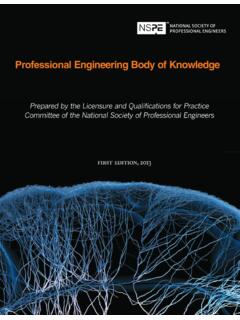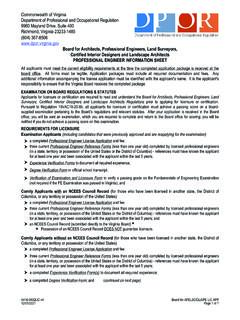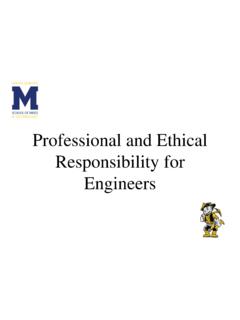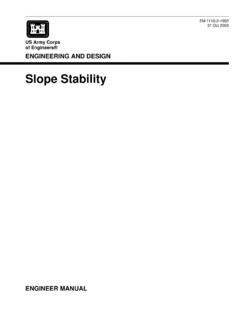Transcription of Making Changes to the Work of Another Engineer Facts
1 NSPE Board of Ethical Review 2/18/10 APPROVED. Case No. 09-6. Pg. 1. Making Changes to the Work of Another Engineer Case No. 09-6. Facts : Two professional engineers with similar backgrounds and expertise in electrical engineering are assigned to the same project because of time constraints and other factors, but are given responsibility for different parts of the project. Engineer A. prepares, designs, and stamps the design documents for which he is responsible, and Engineer B prepares, designs, and stamps the design documents for which he is responsible. The project and design documents are released for construction. A change in project scope requires revision to a subset of the design documents. Both Engineer A. and Engineer B make their respective Changes and revise the design documents for which they are responsible.
2 It is the practice of the company that the engineers' work requires a professional Engineer to manually "initial" the revision block of the document being revised, identifying the responsible Engineer . Engineer A delays release of his revisions which causes completed revisions by Engineer B also to be held until all design documents are ready to be released. Management strongly encourages Engineer A to complete his work so that all design documents can be released. Engineer A completes his work at a point in time when neither Engineer B nor immediate management is available. In completing his work at the behest of management, Engineer A makes minor Changes to design documents prepared and revised by Engineer B without consulting Engineer B. It is understood that Engineer A was technically competent to make the revisions of Engineer B's work.
3 Question: Was it unethical for Engineer A to makes minor Changes to design documents prepared and revised by Engineer B without consulting? References: Section - NSPE Code of Ethics: Engineers, in the fulfillment of their professional duties, shall avoid deceptive acts. Section - NSPE Code of Ethics: Engineers shall approve only those engineering documents that are in conformity with applicable standards. Section - NSPE Code of Ethics: Engineers shall undertake assignments only when qualified by education or experience in the specific technical fields involved. Section - NSPE Code of Ethics: Engineers shall not affix their signatures to any plans or documents dealing with subject matter in which they lack competence, nor to any plan or document not prepared under their direction and control. Copyright 2009 National Society of Professional Engineer (NSPE) All rights reserved.
4 To request permission to reproduce this NSPE Board of Ethical Review Case, please contact the NSPE Legal Department NSPE Board of Ethical Review 2/18/10 APPROVED. Case No. 09-6. Pg. 2. Section - NSPE Code of Ethics: Engineers may accept assignments and assume responsibility for coordination of an entire project and sign and seal the engineering documents for the entire project, provided that each technical segment is signed and sealed only by the qualified engineers who prepared the segment. Section - NSPE Code of Ethics: Engineers shall advise their clients or employers when they believe a project will not be successful. Discussion: The Facts in this case raise some of the central issues involved in the practice of engineering the signing and sealing of engineering work and the professional Engineer 's duties and responsibilities in connection with the signing and sealing of engineering documents.
5 As a starting point, NSPE Code of Ethics Sections , , and address many of the issues related to the Facts of this case. Section seeks to admonish the Engineer to accept work only in those areas of practice in which the Engineer possesses the proper qualifications so as to competently perform the tasks to which he is assigned. Section examines the issue of ethical responsibility and states that an Engineer must sign and seal documents and assume legal responsibility only for that which he possesses understanding and cognizance. Finally, Section establishes a hierarchy of responsibility by which engineers may coordinate and assume responsibility for entire projects, as long as those individuals under the Engineer 's responsible control are identified as having prepared each technical segment of the work. The rationale behind those rules lies in the recognition that while the signature and seal of the Engineer has consequences which go beyond the issue of ethics, the conduct of the Engineer in the preparation of the plans and design documents involves the professional judgment and discretion of the Engineer ; judgment and discretion which are shaped by a variety of ethical concerns.
6 For example, in the BER Case 85-3, an Engineer with experience and background solely in the field of chemical engineering accepted a position as a county surveyor. We noted that while the duties of the position included oversight of surveying reports and highway improvement but no actual preparation of engineering and surveying documents, nevertheless the Engineer was unethical in accepting the position. As the Board noted: "It could be stated that the Engineer 's responsibilities did not include actual preparation or approval of engineering or surveying documents, that instead such documents would be prepared or approved by qualified individuals; his role would be to oversee those documents and reports. We are convinced that neither is this the intent of the NSPE Code provisions nor is this what is commonly understood to be the proper oversight role of a county surveyor.
7 " Clearly, in BER Case 85-3, the Board was faced Copyright 2009 National Society of Professional Engineer (NSPE) All rights reserved. To request permission to reproduce this NSPE Board of Ethical Review Case, please contact the NSPE Legal Department NSPE Board of Ethical Review 2/18/10 APPROVED. Case No. 09-6. Pg. 3. with a situation in which an Engineer was seeking to fulfill a role for which he possessed neither the qualifications nor the experience to perform in a competent manner. In Case 86-2, the Chief Engineer within a large engineering firm affixed his seal to some of the plans prepared by registered engineers working under his general direction who did not affix their seals to the plans. At times, Chief Engineer also seals plans prepared by nonregistered, graduate engineers working under his general supervision.
8 Because of the size of the organization and the large number of projects being designed at any one time, Chief Engineer found it impossible to give a detailed review of the design. He believed he is ethically and legally correct in not doing so because of his confidence in the ability of those he has hired and who are working under his general direction and supervision. By general direction and supervision, Chief Engineer meant that he is involved in helping to establish the concept, the design requirements, and review elements of the design or project status as the design progresses. Chief Engineer is consulted about technical questions and he provided answers and direction in these matters. In finding that it was unethical for Chief Engineer to seal plans that have not been prepared by him, or which he has not checked and reviewed in detail, the Board noted that the role of the chief Engineer in an engineering firm may be that of a "manager who provides guidance, direction, and counsel to those within his responsible charge.
9 ". Indeed, in a large engineering firm, this role is crucial to the successful operation of the firm. The Chief Engineer should be involved at the outset of the project in the establishment of the design concept and the design requirements, as well as in the review of the various elements of the design or project status as the project develops. In addition, the Chief Engineer should be available to consult on technical questions relating to the project design. To this end, we reiterated the language contained in Code Section , noting that "each technical segment [shall be] signed and sealed only by the qualified engineers who prepared the segment," and that the firm and its professional engineers have an ethical obligation that this work be performed under the direct control and personal supervision of licensed engineers who would seal the document.
10 NSPE Code Sections , , and are mutually dependent Code provisions that must be read together in order for them to have meaning. In the context of the Case 86-2, one of the most important aspects of the language of those provisions is the reference to "direction and control" found in Section We think a carefully crafted definition of that provision will assist us in a resolution of the Facts in this case. Copyright 2009 National Society of Professional Engineer (NSPE) All rights reserved. To request permission to reproduce this NSPE Board of Ethical Review Case, please contact the NSPE Legal Department NSPE Board of Ethical Review 2/18/10 APPROVED. Case No. 09-6. Pg. 4. The term "direction" is generally defined by Webster's New Collegiate Dictionary (1981. ed.) as "guidance or supervision of action or conduct; management; a channel or direct course of thought or action.













